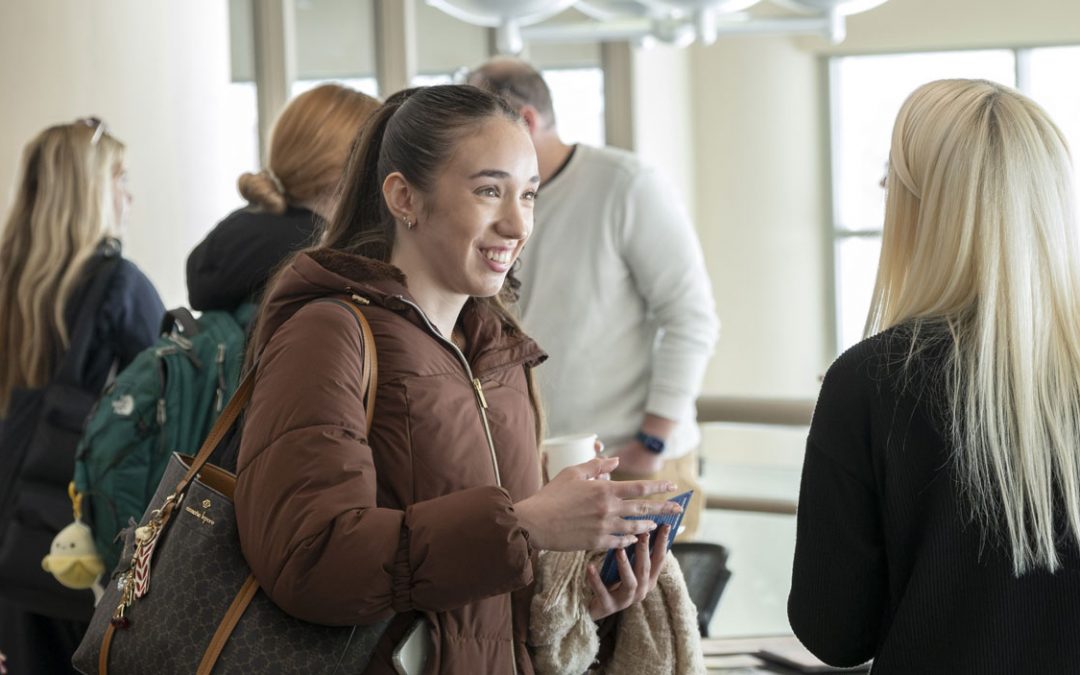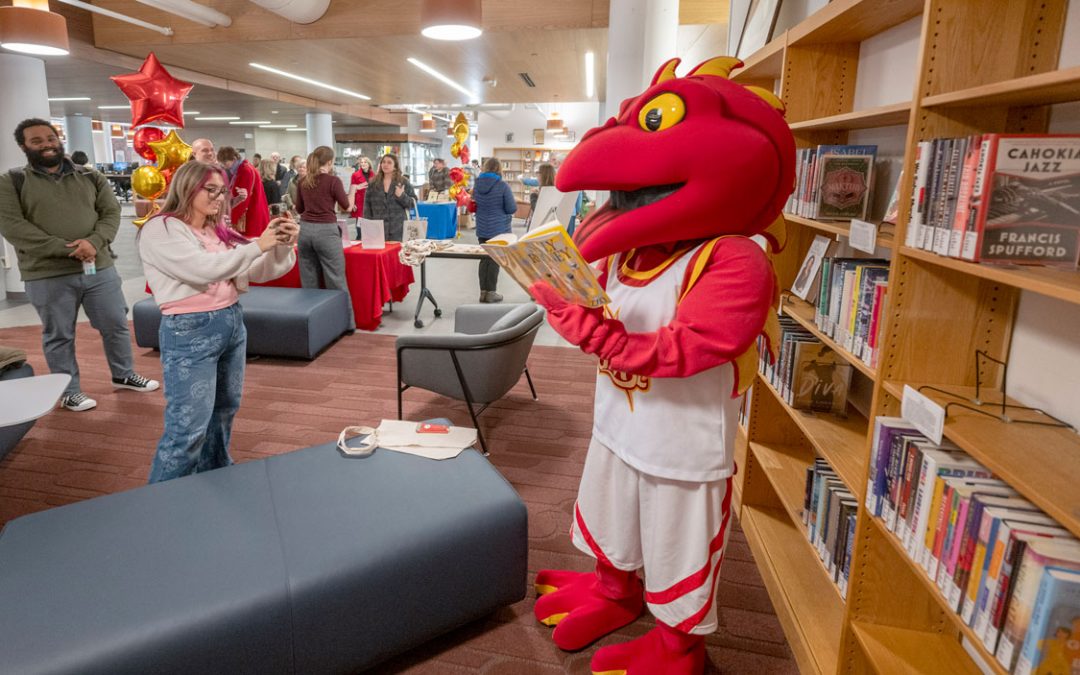
In her new role at the UMSL Veterans Center in Clark Hall, Rebecca McMenamin aims to foster a one-stop shop for the hundreds of student veterans on campus. (Photo by August Jennewein)
Having grown up around military culture, Rebecca McMenamin is well aware of the differences between that world and the realm of higher education. At the University of Missouri–St. Louis, she’s working hard on behalf of 389 student veterans to effectively bridge the two.
“I love to point out to veterans that the structure of the military can be similar to the institution,” says McMenamin, who joined UMSL in June as the first full-time manager of the Veterans Center, a growing hub of activity in Clark Hall. “The chancellor would be your general, and then you have your platoon leaders, like Dean [Ron] Yasbin and the other deans, and then your professor would be your unit leader … I love making those cultural parallels.”
The daughter of a career U.S. Air Force veteran and a sibling to three post-9/11-era military veterans, McMenamin is also familiar with the ins and outs of higher education, making her particularly suited for her new job. In addition to overseeing the center’s operations and activities, she’s responsible for the timely processing of military educational benefits and a go-to resource for UMSL student veterans.
“They already know how to be a veteran,” says McMenamin, whose graduate research focused on the transition from military to higher ed. “They need to know how to be successful in college, which is where I come in.”
Nationally, nearly half of the veterans who enroll in college do not go on to earn a degree, according to a recent study by Student Veterans of America. McMenamin notes that many are balancing multiple priorities in life that often create roadblocks without resources in place to support student-veteran success.
“All three of my siblings went to the military and then got a degree afterwards,” she says. “And I’ve seen them struggle. They had to go part time, it took longer, they have families and so on. So I really see my role as facilitating these processes and advocating for students when things don’t seem to be as easy as they could be – and really building that sense of community.”
McMenamin is quick to applaud UMSL’s existing support system for students in general and particularly the campus commitment to student veterans.
“I’m impressed with what’s already in place as far as the coordination between different offices,” she says. “I think, as opposed to other universities, veterans do have it easier here just in terms of trying to get their benefits and register for classes and develop points of contact. UMSL’s done a really great job of making sure that students go where they need to go. I think our academic programs are amazing, too.”
Along with ensuring that student veterans have a comfortable place to ask a question, study, relax and connect, McMenamin serves in a crucial Veterans Affairs capacity as UMSL’s School Certifying Official.
“That’s part of hiring me on full time and paramount to getting veterans connected to the center and our services,” she says. “In order to get their education benefits, student veterans need to work within the VA system and also meet with their academic adviser and have a certain form filled out. Their adviser sends it here, and then I can actually certify them for their benefits. It’s a very important role, because if we don’t get this right, the VA has the power to withhold that federal funding.”
At UMSL, it amounts to $1.6 million in GI Bill tuition for the fall 2015 semester, McMenamin notes, which supports student veterans pursuing a wide variety of undergraduate, graduate and terminal degrees on campus.
In a few short months, McMenamin has taken initiative and grown the center’s partnerships with other units such as Career Services and New Student Programs as well as outside veteran service organizations and area employers.
“Rebecca’s experience and energy has transformed the Veterans Center from a university-connected social space to an indispensable resource for our student veterans,” says Jim Craig, associate teaching professor and chair of the Department of Military and Veterans Studies. “Her efforts are already yielding success in terms of veteran retention and success on campus. I am excited to have her as a partner in this endeavor.”
In October, McMenamin and the Student Veterans Association organized a service day to build a much-needed 250-foot-long fence for U.S. Vets, a local provider of housing and employment services for homeless veterans. It’s just one recent example of the ways in which UMSL’s student veterans make McMenamin proud to be a resource for them.
“This is my niche,” she says. “I’m so excited, and it’s definitely a population in higher ed that I can feel very passionate about every day and have that family connection to.”















